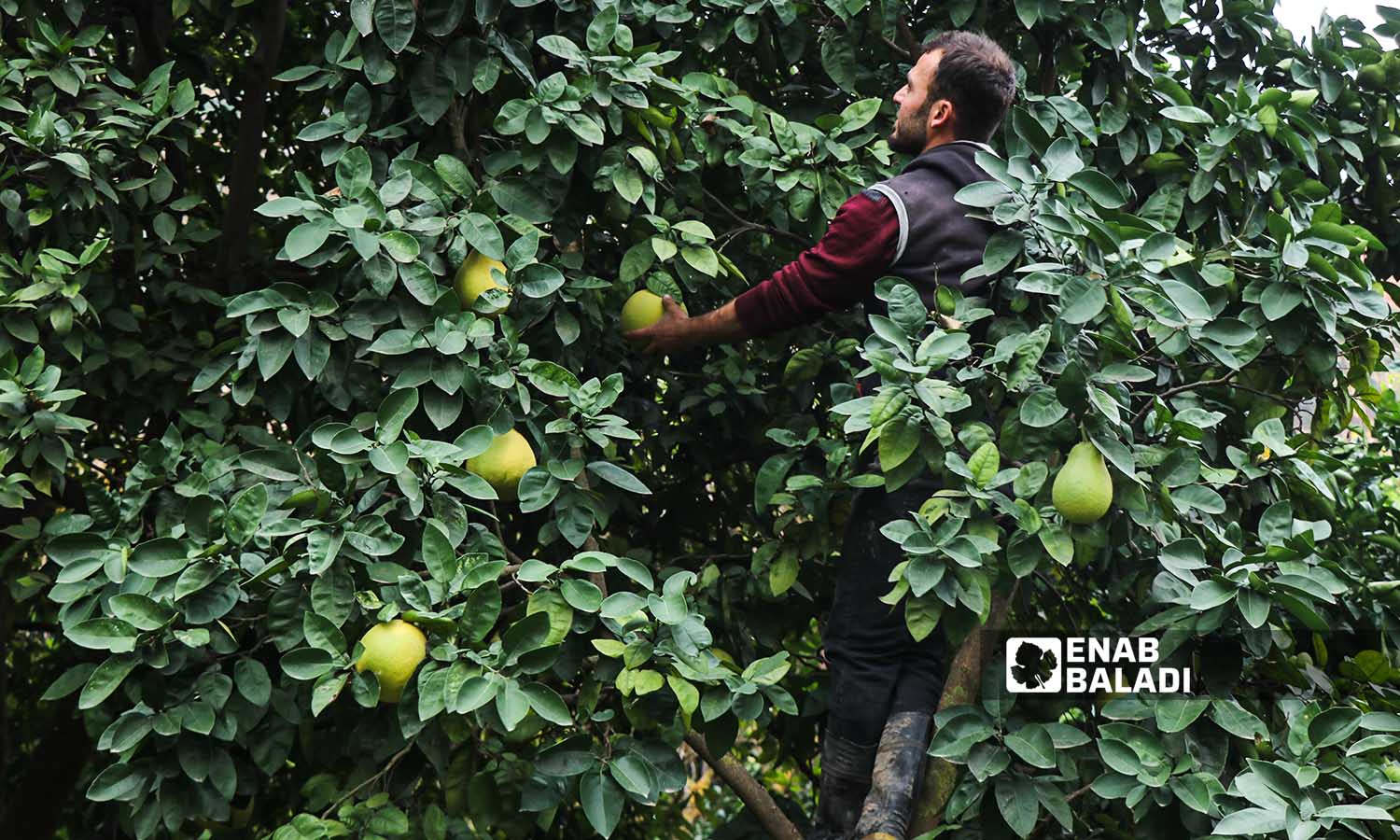



Idlib – Anas al-Khouli
Mokhles al-Durra (50 years old) relies on selling the fruit crops he rents in new ways, such as classifying the product, placing it in his own designed packaging, and selling it directly to citizens to earn additional profits, instead of offering the crops to merchants who buy at lower prices.
Al-Durra has been leasing fruit trees since he was young, a profession he inherited from his father. They rented lands in the Damascus Ghouta throughout the year, moving from one fruit season to another.
After arriving in northern Syria during the forced displacement campaigns in 2018, al-Durra began searching for a geographical location similar to the agricultural environment of Eastern Ghouta and found his goal in the Harem area in northern Idlib, known for its numerous fruit orchards.
The city of Harem is also famous for its mineral water springs and various types of fruit orchards, most notably apricots, plums, mangos, greengages, and figs, in addition to olive and diverse vegetable farming.
Al-Durra told Enab Baladi that the Harem area is a “mini Ghouta” due to the difference in size and agricultural traditions. He noted that he faced difficulty getting to know the farmers and traders upon his arrival in northern Syria.
He mentioned that farmland lessees typically rely on acquaintances and trust among them in selling agricultural seasons, particularly in handling the payment of the land renting amount. Previously, they relied on their relationships with farmers to determine the installment amounts and their timing. Today, however, it requires having large sums immediately available.
According to al-Durra, the large number of farmers and lessees in Harem has led to competition over different seasons. Currently, al-Durra rents ten tons of peaches in Harem, which he previously rented ten times more in Ghouta.
In turn, Ahmed al-Ahmed (45 years old), also displaced from the Damascus countryside, said he used to rent fruit seasons across various agricultural areas in Syria, such as Daraa, As-Suwayda, and both Eastern and Western Ghouta, as well as Zabadani. Currently, all land lessees are limited to the area of Harem, Darkush, and parts of the al-Ghab Plain in northern Syria.
Al-Ahmed added that a single land rent previously exceeded a thousand dunams of crops, while today, the entire area of Harem is about 3000 dunams, housing more than 3000 land lessees from both the region’s locals and displaced people, causing intense competition.
The export of local fruit production from Idlib is supervised by a small number of traders, who have connections with traders in neighboring countries.
Traders monopolize the export process and impose prices that many farmers consider inadequate for their crops.
Some farmers and farmland lessees in northern Syria are searching for alternative ways to market their goods and sell them directly to citizens rather than to traders.
Mokhles al-Durra said that land lessees used to have relations with traders in neighboring countries and exported their crops without intermediaries. However, the displacement and decline in business activities severed these relations.
After beginning to rent crops in the north, these traders imposed low prices on farmers and crops, according to al-Durra.
To avoid being “at the mercy of merchants,” al-Durra created special packages of various capacities (one kilogram, two kilograms, and five kilograms), placed the fruit inside them, and displayed them in his shop for sale.
Al-Durra prefers selling in local markets despite potentially incurring some losses over selling crops to traders. He noted the risky nature of the lessees’ business, which can lead to significant financial losses due to agricultural pests or sudden drops in prices.
On his part, farmer Ahmed al-Ahmed mentioned that farmers and lessees in northern Syria consistently suffer losses due to traders’ monopoly. He pointed out the absence of an association or entity representing and protecting farmers and growers.
Fruit farmers in Idlib complain about the lack of support, absence of markets, and the entry of Turkish products into the markets, leading to financial losses.
In the 2023 season, the fig harvest faced troubled conditions due to the entry of Turkish figs into the markets, poor domestic product marketing, and diseases such as snail infestations, causing a drop in prices and crop stagnation.
Last June, the vineyards in Idlib, northwestern Syria, suffered severe damage that wiped out 95% of the agricultural season, resulting in a 50% production drop due to weather fluctuations.
Tammam al-Hamoud, general director of agriculture in the Syrian Salvation Government in Idlib, told Enab Baladi that the Ministry of Agriculture conducts year-round statistical rounds of the crops, noting that the inventory for the fruit trees for this year has not been completed.
The area of fruit trees (excluding olives) is estimated at about 12,250 hectares, while the olive-cultivated land reaches approximately 80,000 hectares, according to al-Hamoud.
Regarding the fruit exports from Idlib to neighboring countries, al-Hamoud explained that the statistics for the current season are not finalized due to the ongoing season. In 2023, fruit exports reached 15,380 tons, with plums topping the list at 5,434 tons.
if you think the article contain wrong information or you have additional details Send Correction